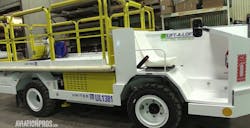Defying an order from the national AFL-CIO, local members of the Duluth AFL-CIO Central Labor Body are supporting striking Northwest Airlines mechanics.
They're also working on issues with unions that left the umbrella labor organization in July.
And today, members of unions from throughout the Northland, whether affiliated with the AFL-CIO or not, will be participating in the annual Labor Day Picnic.
The split in the AFL-CIO that led to the departure of several high-profile unions affects union politics at the highest levels, but in Duluth, union leaders say relations for the most part remain cordial.
"In northern Minnesota, we've always had a good relationship with all the unions," said Patrick Radzak, Teamsters representative in Duluth. "Things aren't really changing."
The Teamsters, United Food and Commercial Workers and Service Workers International Union broke away from the AFL-CIO, dissatisfied that their money wasn't more effectively being used for organizing workers into unions. The three unions represent 5 million workers.
Their Change to Win Coalition will hold a founding convention for the new labor federation on Sept. 27 in St. Louis.
But that's a high-level development. Erik Peterson, director of northern Minnesota programs for the University of Minnesota Labor Education Service, said he believes there's a strong feeling in the labor community that "this is a shouting match among people in D.C. that really doesn't have anything to do withwork on the local level."
The UNITE HERE union also is considering disaffiliating at the national level, but its Local 99 in Duluth doesn't want to leave the Duluth AFL-CIO Central Labor Body, an affiliation of local unions that are members of the labor federation.
"That is my biggest issue," said Todd Erickson, Local 99 staff representative. "I'm not going to jeopardize the relationships I've built here."
Whether the disaffiliated unions will be part of the Central Labor Body remains to be seen. UFCW, with about 4,500 members locally, won't take part under the terms the AFL-CIO has set out, according to Steve Gilbertson, president. Even so, "we still work together on a lot of things," he said, including an upcoming training event concerning long-term care.
Unions have a history of quarreling among themselves, from at least as far back as 1938, when the Congress of Industrial Organizations broke from the American Federation of Labor.
Today, unions are losing strength in the workplace. In 1983, according to the U.S. Department of Labor, 20 percent of the nation's workers were union members. In 2004, just 12.5 percent, 15.5 million, were in unions.
About 17.5 percent of Minnesota's work force and 16 percent of Wisconsin's are organized. The Duluth area historically has had even higher percentages.
Recruiting members is crucial if labor is to retain and regain clout, leadership of the both AFL-CIO and the breakaway unions agree. The divisive behavior of union leaders, though, is "weakening the influence of unions at the national level," said Gary Burtless, a labor economist at the Brookings Institution in Washington, D.C.
"There are real enemies out there to workers... and to make each other into enemies will be our demise," Peterson said.
On the other hand, the actions of the breakaway group "may reawaken the labor movement," said Richard Hudelson, associate professor of philosophy and labor historian at the University of Wisconsin-Superior.
Despite the head-butting up top, even a renegade such as Aircraft Mechanics Fraternal Association, the striking Northwest Airlines mechanics union which has never been part of the AFL-CIO, is receiving support from other local unions.
Pilots, flight attendants and some other airline employees continue to cross picket lines in Duluth and elsewhere. But many local trade unions are sticking up for the strikers and refusing to cross the line even though in 1999 the airline's mechanics voted out the AFL-CIO affiliated International Association of Machinists in favor of AMFA.
"They're union members, and we're trying to help them whether they're with the AFL-CIO or not," said Craig Olson, president of the Duluth Building & Construction Trades Council.
Many locals in the region are providing food, money and other support despite a directive from the national AFL-CIO not to support the strike.
On the picket line at Duluth International Airport, striking mechanics say they've received support from throughout the community.
"If things get really tough, I'm coming down to picket every day, the food is so good," joked mechanic Kurt Shaw.
"When it turns out to be a union in your community... you do not turn their back on them," said Larry Sillanpa, longtime member of the Central Labor Body's board and editor of its Labor World newspaper.
Communications Workers of America Local 7214 in Duluth, for example, has asked U.S. Rep. Jim Oberstar to support AMFA. CWA recently came close to striking, but at the last minute agreed to a tentative contract with Qwest.
That recent experience resonated with CWA members. "It could very well have been us" who went on strike, said Terri Newman, Local 7214 president.
The Duluth area has energetic, creative leaders who have contributed to the region having one of the highest percentages of union membership in the nation, Hudelson said.
And today's picnic could not happen without the participation of the Teamster's, UFCW and other unions, whether they're affiliated with the AFL-CIO or not, Peterson said.
Ego, rather than principle, caused the split at the national level, he said.
"It's just a great irony that this is happening on Labor Day," Peterson said.
Copyright 2005 Associated Press




